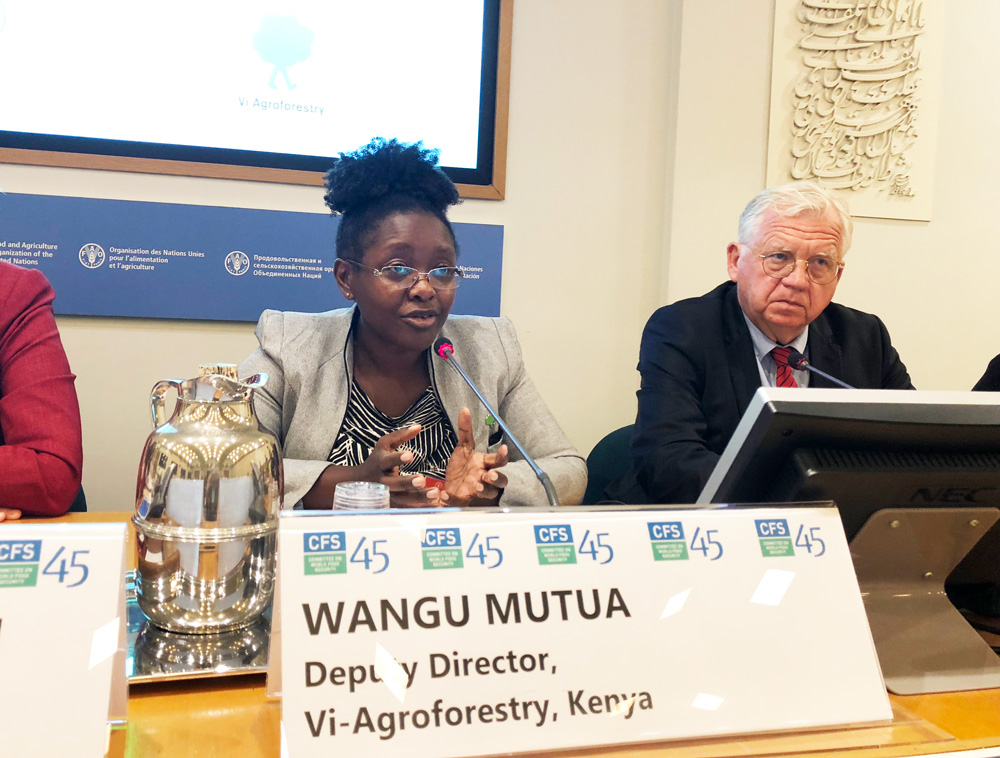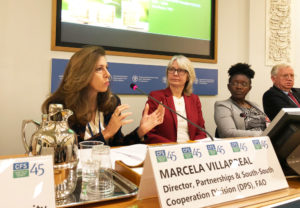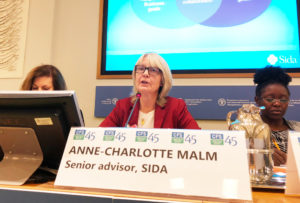Sustainable food systems require new kinds of collaborations to ensure long-term sustainability. With this in mind, partnerships between business, governments, development partners, and civil society are an obvious modus operandi and have been long praised for the potential to share risks, resources, responsibilities and returns.
“Globally we have enough resources to achieve sustainability, the challenge is in coordination and distribution of resources and for that we need public-private partnerships (PPPs),” said Anne-Charlotte Malm (Senior Advisor, Sida) at the Let’s get down to business side event during the 45th session of the Committee on World Food Security. Convened by the Swedish FAO Committee and SIANI, this side event provided examples of PPPs from Sida, FAO, Vi Agroforestry, Stora Enso and SLU, looking into different approaches to deliver on the Sustainable Development Goals (SDGs).
While the need for collaboration is obvious, anyone who has ever been in a long-term relationship, will tell you: a successful partnership needs work. The challenges of PPPs include lack of trust, miscellaneous capacity levels of the partners involved as well as the need to develop case specific business models that are profitable, sustainable and can satisfy various interests despite power imbalances.
“Partnerships have to be found on sound business ideas and make sense for the private partners, otherwise it is not going to work,” said Peter Fogde (Chief Operations Officer, Stora Enso Laos). The Laos management team of Stora Enso, one of the largest pulp and paper industry groups in the world, pioneered a new model for timber production. Contributing to post-war recovery, this project combines commercial forestry with local food production, keeping profits intact. The key feature of this approach was to establish profitable commercial production while addressing the needs of the local communities: “You can’t work against the farmers, you need to work with them, with the people and their needs. That’s how you succeed,” said Peter Fogde.

Wangu Mutua (Deputy Director, Vi Agroforestry, Kenya) presented a different kind of PPP. The model developed by Vi Agroforestry and Livelihoods Funds utilizes revenues from carbon credit to finance sustainable dairy production in the Mount Elgon region of Kenya. Thanks to a combination of agroforestry and livestock management, farmers have significantly improved productivity – milk yields grew from 5, 000 to 135, 000 litres in five years while crop yield increased by 30%.
At the same time, agroforestry practices help to preserve the watershed upstream of Lake Victoria by reducing soil erosion. “The ability to manage multiple project partners from diverse sectors unlocks benefits for climate, livelihoods, development and, of course, profit. At the end of the day companies get the carbon credits, but money is spent with high social effects,” said Wangu Mutua.

“Private sector involvement in development isn’t optional, but it has to be done in a responsible way. Smallholders can’t be the ones bearing all the risks associated with agricultural production. Investment is necessary, but it must be done in a way in which it contributes to sustainable livelihoods,” said Marcela Villarreal (Director of the Partnerships and South-South Cooperation Division, DPS, FAO). Approaching partnership development from a food system perspective the FAO works as a facilitator and mediator, fostering the development of a favourable environment in which partnership can sprout and root.
One major challenge of the PPPs, particularly in a low-income setting, is lack of capacity among communities. Because of poverty people may take offers that only satisfy short-term needs and do not provide sustainable outcomes, cases when farmers gave away their land for a one-time payment are not uncommon. FAO recognizes this pitfall and strives to develop community capacities, providing education and training for local people to become empowered and to effectively participate in the decisions that will affect their lives, including policy processes.
Providing private sector with clear goals is another key success factor, according to Marcela Villarreal. “We invite private sector partners to contribute to very specific development goals, which are tailored to the achievement of the 2030 Agenda. This way, companies understand how exactly they can apply their high-tech know-how in sustainability,” said Villarreal. Examples of such partnerships include forest cover monitoring with the Google Earth Engine, an agreement with Telefónica to use Big Data and the Internet of Things and Big Data for efficient water use in Central American Dry Corridor and an MoU with the Boulder Institute of Microfinance for inclusive rural finance.

Bringing the donor perspective, Anne-Charlotte Malm spoke about ways to improve corporate behaviour through networks. The Swedish Leadership for Sustainable Development is a network coordinated by Sida. It comprises 20+ expert organizations and Development Finance Institutions which has become a forum for knowledge-exchange, project development and collaborative models to implement the Sustainable Development Goals.
In 2016 Sida also launched the Swedish Investors for Sustainable development platform – a unique partnership, where 8 institutional investors, pension companies, investment companies and Sida work side by side to find investment opportunities in the most pressing development issues. Sida also hosts two accelerator programs (challenge funds) to handpick and fund innovative water and energy solutions for agricultural development.
As we are going ahead with the sustainability agenda, public-private partnerships are moving from ideas to reality, it is essential to establish win-win collaborations: “The biggest problem is trust, once you get this key ingredient, you can replicate our model in other places,” said Wangu Mutua. It is also crucial to understand that building trust takes time, sometimes it takes partnerships years before they take off.
At the same time, unlike politicians, businesses are not subjected to election terms and therefore are well-positioned to provide long-term investment and engagement. In this sense, trust building efforts are worth spending time on: “We can see huge change, there is a massive transformation in the mindsets, and it starts from the recognition that private sector can be a partner,” said Marcela Villarreal.
Read the report on partnerships with private sector by the Swedish FAO Committee.
Läs om eventet på Svenska FAO-kommittén webbplats
